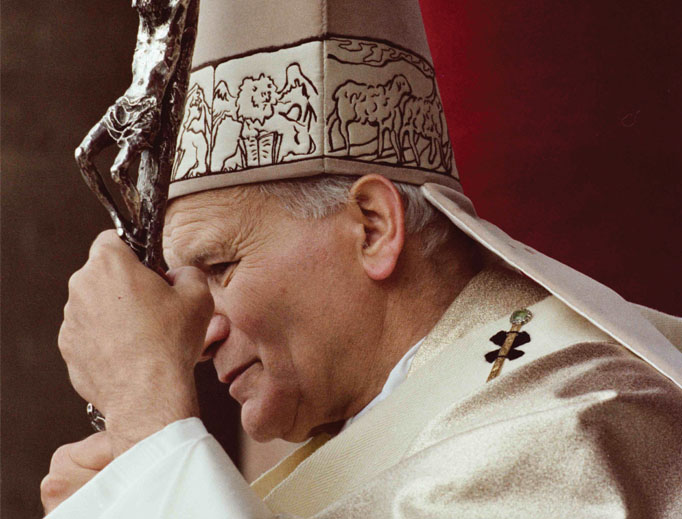Today we commemorate Pope Saint John Paul II, for this day chosen as his ‘feast’ marks the 40 anniversary of his coronation as the 264th successor of Saint Peter as the Vicar of Christ, and the tender age of 58 (tender for a Pope); he would go on to have the second-longest serving Pope in history after Pope Blessed Pius IX, or third, if we include Saint Peter’s own reign as the longest.
The pontificate of John Paul was indeed ‘great’ in so many senses of that term, spiritually, intellectually, pastorally and, in one of his own favorite terms, personally. For what really makes someone significant is how he stands before God, as a ‘person’ made and perfected in the image of God’s own Personhood, for that a man is and nothing more, as one saint put it. This holds whether that person is world-famous, as this Pope was, his handsome visage posted everywhere; or unknown to the world, as so many contemplatives, monks, nuns, have been.
Karol Wojtyla originally wanted to follow the latter path, to offer himself as a Carmelite, driven by his love of prayer and solitude, to be ‘alone with God’, but his spiritual director advised the diocesan priesthood, and we have all been the richer for that decision young Karol made, to give himself completely to God in pastoral and spiritual service, right up until the end, ravaged by Parkinson’s, where he offered his own weakness, pain and debility in what may have been his most powerful personal testament.
I will just offer today, in light of the current Synod, an excerpt from Pope John Paul’s 1984 powerful Letter to Youth, which I hope has been read by all the episcopal and advisory participants, and would provide invaluable help in their own discernment on what young people ‘need’ in these troublous times. This bit is on the role of conscience, emphasized in a number of the Popes works, for it is the daily decisions of conscience that shape who we will become, hopefully for the better, and the role of said conscience in the time of youth is indispensable and unrepeatable. As a pastor and spiritual director, Father Wojtyla made demands upon the young people whom he advised, for only he who makes such demands upon himself can grow in holiness, be magnanimous, or ‘great in soul’, and become the person, the saint, that God intends each of us to be. Any other path is nothing less than tragic, and God wills the good, nay, the best, for us all.
Dear young friends! The response which Jesus gives to his questioner in the Gospel is addressed to each one of you. Christ asks you about the state of your moral awareness, and at the same time he questions you about the state of your conscience. This is a key question for man: it is the fundamental question of your youth, one that concerns the whole plan of life which must be formed precisely in youth. Its value is the one most closely connected with the relationship of each of you with moral good and evil. The value of this plan depends in an essential way on the authenticity and rectitude of your conscience. It also depends on its sensitivity.
So we find ourselves here at a crucial moment, when at every step time and eternity meet at a level which is proper to man. It is the level of the conscience, the level of moral values: the conscience is the most important dimension of time and history. For history is written not only by the events which in a certain sense happen “from outside”; it is written first of all “from within”: it is the history of human consciences, of moral victories and defeats. Here too the essential greatness of man finds its foundation: his authentically human dignity. This is that interior treasure whereby man continually goes beyond himself in the direction of eternity. If it is true that “it is established that people would die only once”, it is also true that man carries with him the treasure of conscience, the deposit of good and evil, across the frontier of death, in order that, in the sight of him who is holiness itself, he may find the ultimate and definitive truth about his whole life: “after that comes judgment”.(37)
This is just what happens in the conscience: in the interior truth of our acts, in a certain sense, there is constantly present the dimension of eternal life. And simultaneously the same conscience, through moral values, imprints the most expressive seal upon the life of the generations, upon the history and culture of human environments, societies, nations and of all humanity.
In this field how much depends on each one of you!

